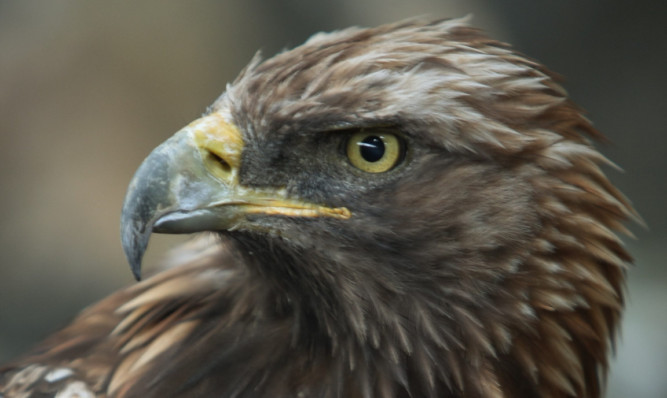Scotland’s gamekeepers have gone to war with the RSPB over the illegal killing of a golden eagle.
The bird was found in Deeside last May but the charity has claimed it was motionless for hours in an Angus glen the night before, suggesting it may have been caught in a trap there.
The Scottish Gamekeepers Association (SGA) took the unprecedented step of mounting its own investigation and has now accused the charity of damaging the profession through its handling of the case.
In response, the RSPB condemned the SGA as “apologists for the worst types of wildlife crime”.
The young bird was discovered face-down and with its wings folded under a tree near Aboyne, but it took some four months for the discovery to be made public.
A post-mortem concluded it had suffered two broken legs, which experts said was consistent with a spring-trap injury.
RSPB Scotland subsequently revealed tracking data showed the eagle had spent 15 hours on a hill overlooking Glen Esk the day before its body was discovered, giving rise to speculation that the bird may have died in Angus and been taken under cover of darkness to the spot where it was dumped.
Grampian and Tayside Police were involved in the inquiry and RSPB Scotland offered a £1,000 reward in the case, but no one has been prosecuted.
The SGA has now launched an attack on the charity on the back of its own probe after it saw “sufficient dubiety in the interpretation released to the media” by the RSPB.
A spokesman said: “The SGA has worked extremely hard as an active partner in Partnership for Action Against Wildlife Crime (PAW) and is proud of the dramatic fall in the number of bird of prey abuse cases in Scotland.
“However if it is found that no evidence of wrongdoing is established in this case, and because of the unverified claims reported by the RSPB to the media, the SGA feels it is important to call into question whether it is appropriate that any singular organisation, with a clear political agenda should be privy to such sensitive evidence under the guise of expert witnesses in crime cases.
“To be able to use privileged information (to which all other partners in PAW are denied access) in order to make damaging media statements against a profession raises serious questions about fairness of process, particularly if police have found no clear evidence of criminality.
“It is the view of the SGA that, in the interests of judicial and media fairness to the people of Scotland, those called in to assist police in wildlife crime investigations should be held accountable for the information they are privy to, as impartial bodies.
“At the moment, when a suspected wildlife crime is reported, police carry out the investigation using various experts for issues such as the identification of species.
“The Scottish people are entitled to ask whether they feel it is right that ‘experts’ should then publish personal interpretations which may prejudice future court proceedings or, indeed, prejudice the public against what could be innocent parties.”
In response, Duncan Orr-Ewing, head of species and land management at RSPB Scotland, said: “We reject absolutely these unprofessional assertions of the SGA.
“Our previous media statement followed proper discussion and approval from the police, and was in full accordance with our joint working protocol.
“The official post-mortem report concluded that the bird had suffered two broken legs due to trauma “that could be consistent with an injury caused by a spring type trap” and that the severity of these injuries “would prevent the bird from being able to take off”.
“This is a rather desperate statement from the SGA, which seemingly does more to reveal their true nature as apologists for the worst types of wildlife crime, as they try to defend the indefensible.
“Indeed, it calls into question their very commitment to the aims and objectives of the Partnership for Action Against Wildlife Crime Scotland (PAWS).
“The illegal killing of golden eagles in Scotland is still a serious conservation issue.
“Rather than seeking excuses, we believe that the Scottish Gamekeepers Association’s efforts would be better directed at tackling those within their sector who still encourage such outdated practices.”
